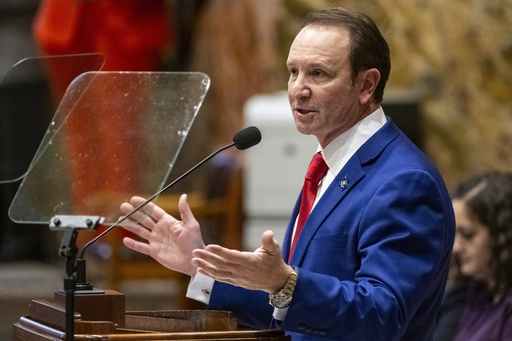NEW ORLEANS — Louisiana Governor Jeff Landry marked a significant political achievement on Thursday by enacting extensive tax reform measures approved by state legislators. These reforms feature a reduction of the individual income tax to 3%, alongside a decrease in corporate taxes and an increment in the state sales tax. Landry also enabled a series of proposed amendments to the state constitution that will be presented to voters in March.
“You all have brought about generational change,” stated Landry, as he stood with a bipartisan group of lawmakers at the Capitol in Baton Rouge. “This allows for a new chapter in Louisiana, one where every working citizen retains a larger portion of their hard-earned income.”
As a Republican, Landry emphasized that these reforms would generate $1.3 billion in income tax reductions for Louisiana’s citizens. The reforms also aim to significantly increase the standard deduction for individuals and double deductions available for senior citizens. Previously, individuals earning $50,000 or more faced an income tax rate of 4.25%. Lawmakers believe these measures could help counteract the trend of people leaving the state.
To fund the substantial tax cuts, Landry endorsed a rise in the state sales tax to 5% for the next five years; it will then revert back to 4.75%. The tax stood at 4% before a temporary increase of 0.45% set to end next year. Furthermore, Landry consented to redirect $280 million from vehicle sales tax revenue that was designated for significant infrastructure projects to facilitate the tax cuts over the coming two years.
Landry remarked that the additional changes would enhance the state’s competitive edge for businesses. Corporate income tax rates for large businesses are being lowered from 7.5% to 5.5%. Moreover, Louisiana has eliminated the 0.275% corporate franchise tax, which Republicans had criticized as a barrier to economic growth for businesses with annual revenues over $500 million.
“Our complex business tax regulations have finally been reformulated for fairness, positioning us to compete better with neighboring states,” Republican Representative Julie Emerson asserted, having sponsored several pivotal bills that were signed by Landry.
According to Economic Development Secretary Susan Bourgeois, the corporate tax reductions send a clear message: “We are ready to compete, and we want you here.”
Landry, alongside his GOP allies in the legislature, pushed for this tax reform package during an intensive special session in November — the third of its kind since he took office in January. While the Democratic members in the Senate largely supported the tax initiatives, some House Democrats cautioned that the cuts would primarily advantage the wealthiest individuals and corporate shareholders.
Critics have highlighted that raising the state sales tax places a disproportionate burden on low-income families. Louisiana currently holds the highest combined state and average local sales tax in the nation, according to research by the Tax Policy Foundation.
The tax reform legislation also included various proposed constitutional amendments aimed at simplifying a number of complex provisions in the state constitution. These modifications involve liquidating several education trust funds to alleviate nearly $2 billion in debt owed by school districts. The savings would be directed toward making a $2,000 pay increase for teachers a permanent measure. Additionally, a proposed amendment seeks to impose a cap on growth, limiting available funding for recurring state expenditures each year.
Beyond tax-related amendments, Landry also ratified other constitutional proposals. One of these would enable lawmakers to broaden the list of offenses for which minors could be tried and sentenced in adult courts, effectively removing existing constitutional restrictions. Proponents claim this would bolster public safety by allowing for heftier sentences for minors found guilty of serious crimes. Conversely, critics argue it risks undermining rehabilitation efforts and does not tackle the fundamental issues contributing to juvenile crime.
“If you care about kids, voting in favor of this amendment is crucial,” asserted Landry.
Another proposed amendment would give lawmakers the authority to establish specialty courts. Proponents say this would add flexibility to the justice system, allowing the creation of regional drug courts in rural areas that lack sufficient resources. However, some Democrats have voiced concerns that the broad wording of this amendment could grant Republicans increased control over the justice system in predominantly Democratic areas like New Orleans.
The proposed constitutional amendments are set to be presented to voters on March 29.


